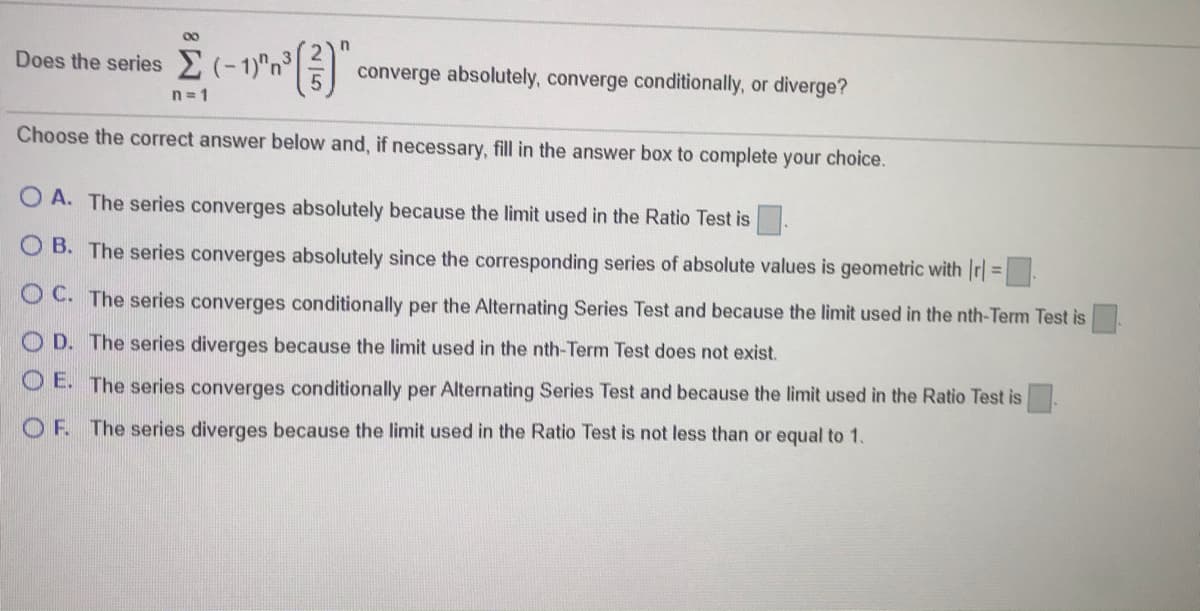Does the series E (-1)"n converge absolutely, converge conditionally, or diverge? n= 1 Choose the correct answer below and, if necessary, fill in the answer box to complete your choice. O A. The series converges absolutely because the limit used in the Ratio Test is O B. The series converges absolutely since the corresponding series of absolute values is geometric with Ir| = O C. The series converges conditionally per the Alternating Series Test and because the limit used in the nth-Term Test is O D. The series diverges because the limit used in the nth-Term Test does not exist. O E. The series converges conditionally per Alternating Series Test and because the limit used in the Ratio Test is O F. The series diverges because the limit used in the Ratio Test is not less than or equal to 1.
Does the series E (-1)"n converge absolutely, converge conditionally, or diverge? n= 1 Choose the correct answer below and, if necessary, fill in the answer box to complete your choice. O A. The series converges absolutely because the limit used in the Ratio Test is O B. The series converges absolutely since the corresponding series of absolute values is geometric with Ir| = O C. The series converges conditionally per the Alternating Series Test and because the limit used in the nth-Term Test is O D. The series diverges because the limit used in the nth-Term Test does not exist. O E. The series converges conditionally per Alternating Series Test and because the limit used in the Ratio Test is O F. The series diverges because the limit used in the Ratio Test is not less than or equal to 1.
Advanced Engineering Mathematics
10th Edition
ISBN:9780470458365
Author:Erwin Kreyszig
Publisher:Erwin Kreyszig
Chapter2: Second-order Linear Odes
Section: Chapter Questions
Problem 1RQ
Related questions
Question

Transcribed Image Text:Does the series
converge absolutely, converge conditionally, or diverge?
n= 1
Choose the correct answer below and, if necessary, fill in the answer box to complete your choice.
O A. The series converges absolutely because the limit used in the Ratio Test is.
O B. The series converges absolutely since the corresponding series of absolute values is geometric with Ir| =
O C. The series converges conditionally per the Alternating Series Test and because the limit used in the nth-Term Test is
O D. The series diverges because the limit used in the nth-Term Test does not exist.
O E. The series converges conditionally per Alternating Series Test and because the limit used in the Ratio Test is.
O F. The series diverges because the limit used in the Ratio Test is not less than or equal to 1.
Expert Solution
This question has been solved!
Explore an expertly crafted, step-by-step solution for a thorough understanding of key concepts.
This is a popular solution!
Trending now
This is a popular solution!
Step by step
Solved in 2 steps with 2 images

Knowledge Booster
Learn more about
Need a deep-dive on the concept behind this application? Look no further. Learn more about this topic, advanced-math and related others by exploring similar questions and additional content below.Recommended textbooks for you

Advanced Engineering Mathematics
Advanced Math
ISBN:
9780470458365
Author:
Erwin Kreyszig
Publisher:
Wiley, John & Sons, Incorporated

Numerical Methods for Engineers
Advanced Math
ISBN:
9780073397924
Author:
Steven C. Chapra Dr., Raymond P. Canale
Publisher:
McGraw-Hill Education

Introductory Mathematics for Engineering Applicat…
Advanced Math
ISBN:
9781118141809
Author:
Nathan Klingbeil
Publisher:
WILEY

Advanced Engineering Mathematics
Advanced Math
ISBN:
9780470458365
Author:
Erwin Kreyszig
Publisher:
Wiley, John & Sons, Incorporated

Numerical Methods for Engineers
Advanced Math
ISBN:
9780073397924
Author:
Steven C. Chapra Dr., Raymond P. Canale
Publisher:
McGraw-Hill Education

Introductory Mathematics for Engineering Applicat…
Advanced Math
ISBN:
9781118141809
Author:
Nathan Klingbeil
Publisher:
WILEY

Mathematics For Machine Technology
Advanced Math
ISBN:
9781337798310
Author:
Peterson, John.
Publisher:
Cengage Learning,

